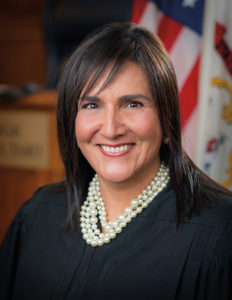Judge, Circuit Court of Kanawha County

Photo by Rick Lee.
By Katlin Swisher.
As a former board member and 2017 YWCA Women of Achievement honoree, the YWCA’s mission, “Empowering women, eliminating racism and promoting peace, justice, freedom and dignity for all,” defines Joanna Tabit’s approach to not only the legal profession but also to life.
As a Kanawha County Circuit Court judge in Charleston, WV, she strives to carry out that mission as a mentor to young lawyers, which she believes is one of the most critical components to their success. She has also mentored aspiring lawyers during her career as a public and private practitioner and as an adjunct lecturer at her alma mater, West Virginia University (WVU) College of Law.
Tabit knows firsthand the importance of mentorship. While she credits former Supreme Court Justice Thomas McHugh, current Justice Margaret Workman and U.S. District Judge Irene Berger as mentors who have provided invaluable guidance to her throughout her career, there was no greater influence in her life than her parents. “All that my sisters and I are is because of them and the women they raised us to be,” she says.
Tabit’s volunteer work is not limited to mentoring. She has been a member of various professional legal groups, including the West Virginia State Bar Board of Governors and the Young Lawyers Section of the State Bar, board member of the Kanawha County Public Defender’s Office, co-chair for the Campaign for Legal Aid, chairperson of the Access to Justice Foundation and District 8 Character Committee of the West Virginia Board of Law Examiners and officer of the Kanawha County Bar Association. She has also served on the board of directors for several nonprofit organizations, including the YWCA, Kanawha Pastoral Counseling Center and Daymark, Inc.
As an attorney, she was a member of the pro bono referral project of the West Virginia State Bar and served as a pro bono attorney for the Civil Legal Assistance Partnership, which provided representation at hearings for victims of domestic violence. Although she had to resign some of these positions upon becoming a judge, serving the greater Kanawha Valley is still a priority for Tabit.
“Everyone has abilities, talents or experiences that someone else can benefit from,” she says. “I get involved in the causes I believe in because it’s easy to be inspired when you really care about something.”
Working as a private practice attorney for 22 years prior to becoming a judge, Tabit did not specialize in a particular area of the law. That varied legal experience, especially as a trial lawyer, eased her transition to the bench.
“I considered myself a trial lawyer first and, when necessary, an appellate lawyer. I’ve tried personal injury, product liability, medical malpractice, governmental liability and employment cases. I liked doing a little bit of everything because I was always learning,” she says. “This helps me as a judge because I know and understand the law yet also have an appreciation and understanding of the pressures of the practice, and that’s important.”
As a Kanawha County Circuit Court judge for the last two and a half years, Tabit’s docket includes criminal and civil cases; magistrate court, family court, municipal court and administrative appeals; juvenile matters; and child abuse and neglect cases.
“Child abuse and neglect cases comprise at least 50 percent of our court’s docket and are, in my opinion, the most challenging and important work we do,” says Tabit. “The termination of parental rights is the most serious sanction for a parent. It’s a death penalty for a parent inasmuch as you are permanently removing the child from his or her parent’s life. While in private practice, I had some limited experience with abuse and neglect as a young lawyer, but I didn’t appreciate how deeply invested you become in these cases as a judge.”
Every day, Tabit experiences how deeply drugs and abuse affect nearly every facet of her work and her community. The opportunity to help individuals overcome their circumstances and get their lives back on track provides motivation for her to persevere.
“Sadly, I learned quickly that drugs permeate virtually everything we do. Drugs tragically touch everything—not just the adult felony cases,” she says. “I want to do the best job I can for the people of Kanawha County. I strive to contribute positively to the administration of justice in our state and to be a vital part of our community.”



